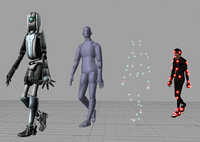
Photo from wikipedia
Family presence during invasive procedures or cardiopulmonary resuscitation (CPR) is a part of the family-centered approach in pediatric intensive care units (PICUs). We established a simulation program aiming at providing… Click to show full abstract
Family presence during invasive procedures or cardiopulmonary resuscitation (CPR) is a part of the family-centered approach in pediatric intensive care units (PICUs). We established a simulation program aiming at providing communication tools to healthcare professionals. The goal of this study was to evaluate the impact of this program on the stress of PICU professionals and its acceptance. An observational study of a simulation program, with questionnaire, was used to measure pre- and post-simulation stress and the degree of satisfaction of the participants. PICU of Geneva Children’s Hospital, Switzerland. Forty simulations with four different simulation scenarios and various types of parental behavior, as imitated by professional actors, were completed during a 1-year period. Primary outcomes were the difference in perceived stress level before and after the simulation and the degree of satisfaction of healthcare professionals (nursing assistants, nurses, physicians). The impact of previous experience with family members during critical situations or CPR was evaluated by variation in perceived stress level. Overall, 201 questionnaires were analyzed. Perceived stress associated with parental presence decreased from a pre-simulation value of 6 (IQR, 4–7) to 4 (IQR, 2–5) post-simulation on a scale of 1–10. However, in 25.7% of cases, the individually perceived post-simulation stress level was higher than the pre-simulation one. Satisfaction of the participants was high with a median of 10 (IQR, 9–10) out of 10. Conclusions: A simulation program helps reduce PICU team emotional stress associated with the presence of family members during critical situations or CPR, and is welcomed by PICU team members. What is Known: • Family presence during cardiopulmonary resuscitation (CPR) or critical situations is a part of the family-centered approach in pediatric intensive care. • The benefits for the family have been already demonstrated. However, this policy is still controversy among healthcare professionals. What is New: • A simulation program seeking to provide skills focused on family presence management in the PICU is useful to reduce stress and was well accepted by participants. • It might become an indispensable training intervention for the implementation of a PICU policy to allow family presence during CPR or other critical situations. What is Known: • Family presence during cardiopulmonary resuscitation (CPR) or critical situations is a part of the family-centered approach in pediatric intensive care. • The benefits for the family have been already demonstrated. However, this policy is still controversy among healthcare professionals. What is New: • A simulation program seeking to provide skills focused on family presence management in the PICU is useful to reduce stress and was well accepted by participants. • It might become an indispensable training intervention for the implementation of a PICU policy to allow family presence during CPR or other critical situations.
Journal Title: European Journal of Pediatrics
Year Published: 2022
Link to full text (if available)
Share on Social Media: Sign Up to like & get
recommendations!